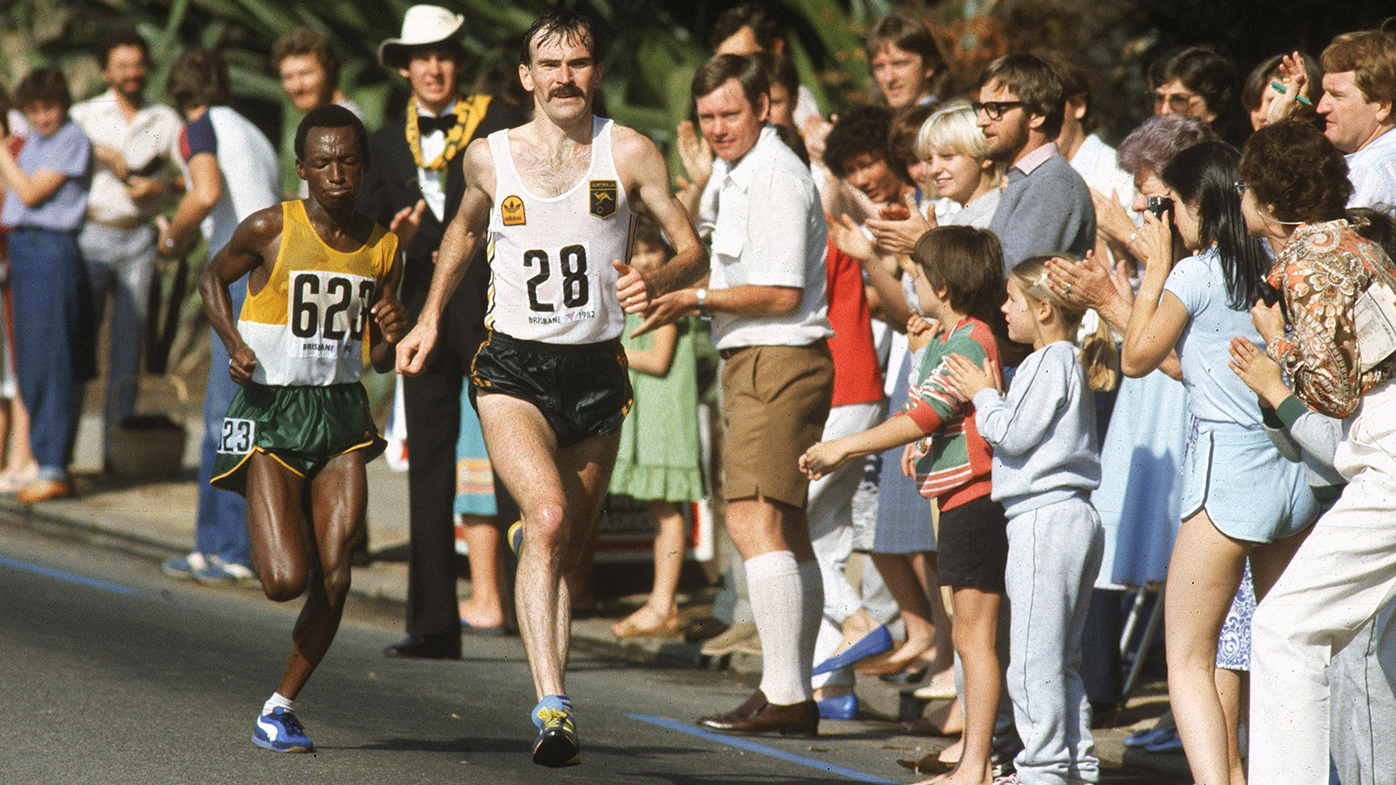
As the 40th anniversary of Robert de Castella's triumph at the 1982 Commonwealth Games draws closer, the Australian marathon legend remembers the "choreography" and "drama".
Not only had a world-record run in the Fukuoka marathon a year earlier installed de Castella as a hot favourite, a hugely successful Brisbane Commonwealth Games were wrapping up as the runners gathered on Stanley Street at 6am.
What followed was a 42.195-kilometre grind in which de Castella dragged himself back from a seemingly doomed position to win in 2:09:18 on a hilly course.
ULTIMATE GUIDE: Commonwealth Games 2022
READ MORE: The big lesson 'emotional' week taught Manly
READ MORE: Ricciardo's defiance 'no surprise' to McLaren
Moments after, Australian running icon Ron Clarke described the performance as "the best marathon ever run".
De Castella, 25 at the time, had wound through streets packed with thousands of spectators cheering wildly for their hero at home.

"It was like this wall ... that would part when I got within a few metres of them," he tells Wide World of Sports.
"So it was an amazing atmosphere."
Brisbane's humidity had hit 94 per cent by the time the gun was fired, but the sweltering conditions didn't stop two Tanzanians and a Kenyan dashing straight to the lead.
De Castella, nestled in a pack of nine, clocked 15:09 for the first five kilometres, placing him on track to beat his own world record.
But the two Tanzanians, Juma Ikangaa and Gidamis Shahanga, and Kenyan Sammy Mogere, had flown through five kilometres in 14:45.
Despite surrendering a considerable lead early, de Castella wasn't worried.
"I always believed that the marathon is about the last 10 kilometres; it's not about the first 30. So, I was optimistic that maybe they'd gone out too fast," de Castella says.
"I knew it was warming up ... the conditions were getting tougher and tougher."
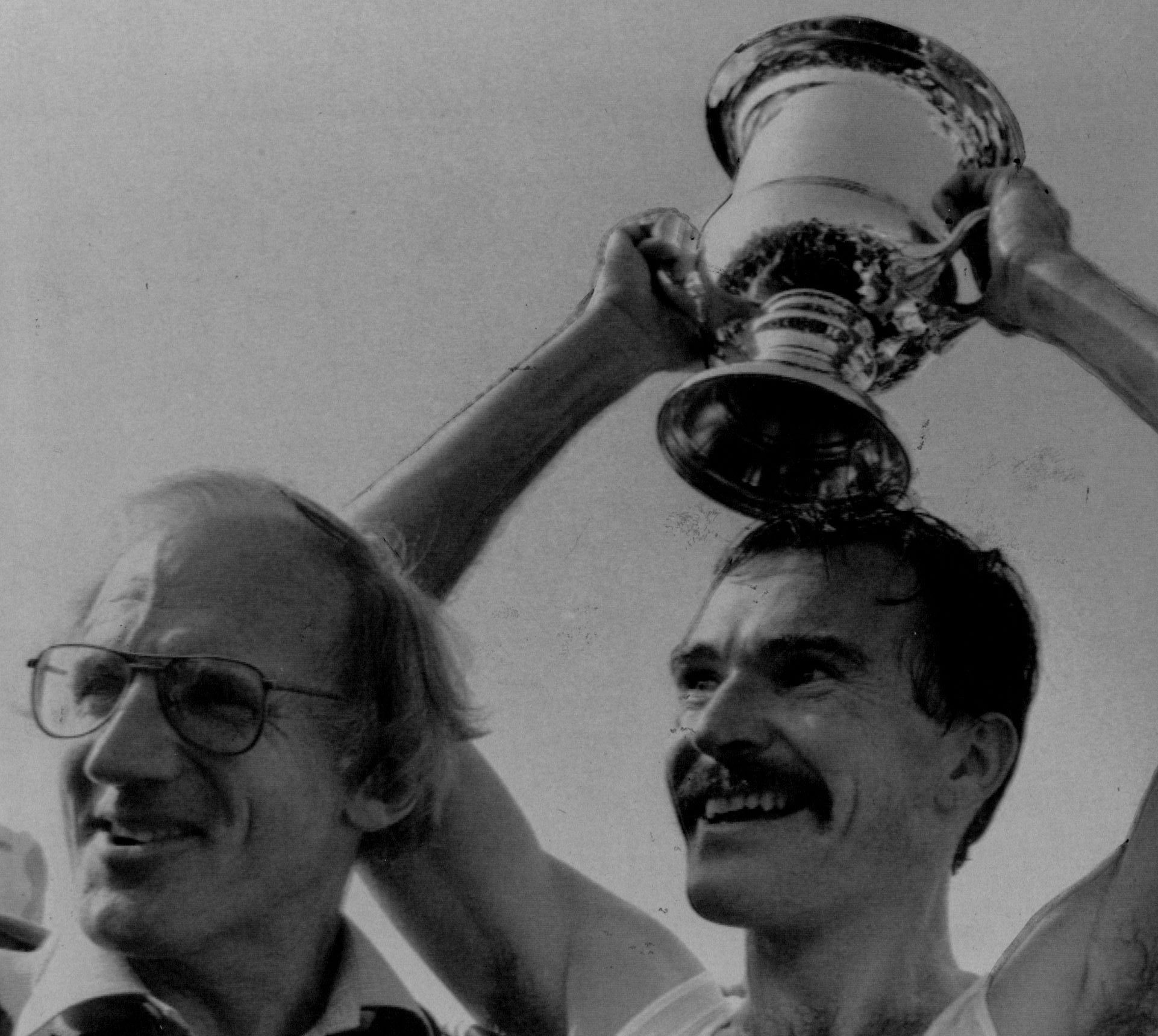
The first chasing pack quickly gobbled up Mogere, but the Tanzanians were putting on a show of resistance that had de Castella's coach worried.
Pat Clohessy, positioned at the Crest Hotel, had pain written all over his face as de Castella passed halfway 40 seconds behind the leaders.
"Coming back through Brisbane in the city when I saw my coach on the starting line ... I saw the real worried look on his face," de Castella says with a laugh, while admitting he had "no idea" how far behind he'd fallen.
"At that stage I was just settling into a bit of a rhythm and a groove with the other guys, and I think when I saw that it gave me a bit of a wake-up."
But Ikangaa and Shahanga continued to streak ahead.
They led by 55 seconds at 25 kilometres and 58 seconds at 30 kilometres, by which point de Castella had powered ahead of the first chasing pack.
If the Victorian was to have the gold medal draping around his neck, he had to make a move.
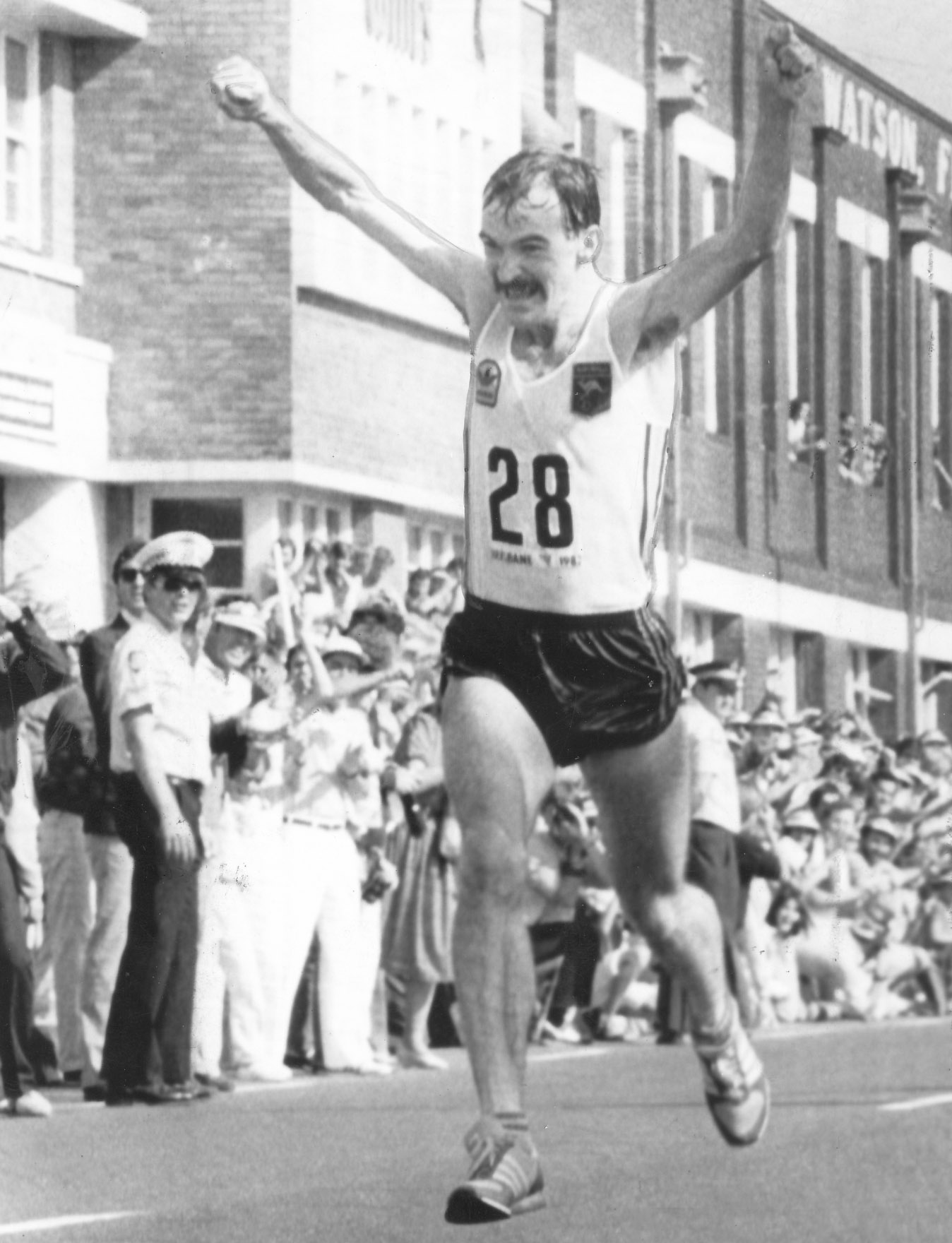
"I pulled my finger out and really started to get out and chase," de Castella says.
"I flicked the switch from being relatively coasting and relatively comfortable to putting a bit of pressure on myself.
"I mainly just remember the look on Pat's face, which I think I'll remember forever. He really wears his heart on his face, and to see the concern that he had was a bit of a shock."
De Castella was suddenly hit with intense stomach pain, but he ploughed through the discomfort as he powered from the 30-kilometre mark to the 35-kilometre point in 15:28 — 20 seconds quicker than Ikangaa, who had opened a gap on Shahanga.
De Castella mowed down Shahanga at 37 kilometres, prompting roars from footpaths, packed local pubs and the thousands following every move on radio or TV.
It was about 39 kilometres into the run that de Castella, pounding up the hill on Coronation Drive, loomed up on Ikangaa.
The African — short, slim and lithe — glanced over his right shoulder as the moustachioed de Castella — driving his bushy tree-trunk legs and pumping his arms — drained every ounce of energy from his hulking frame.
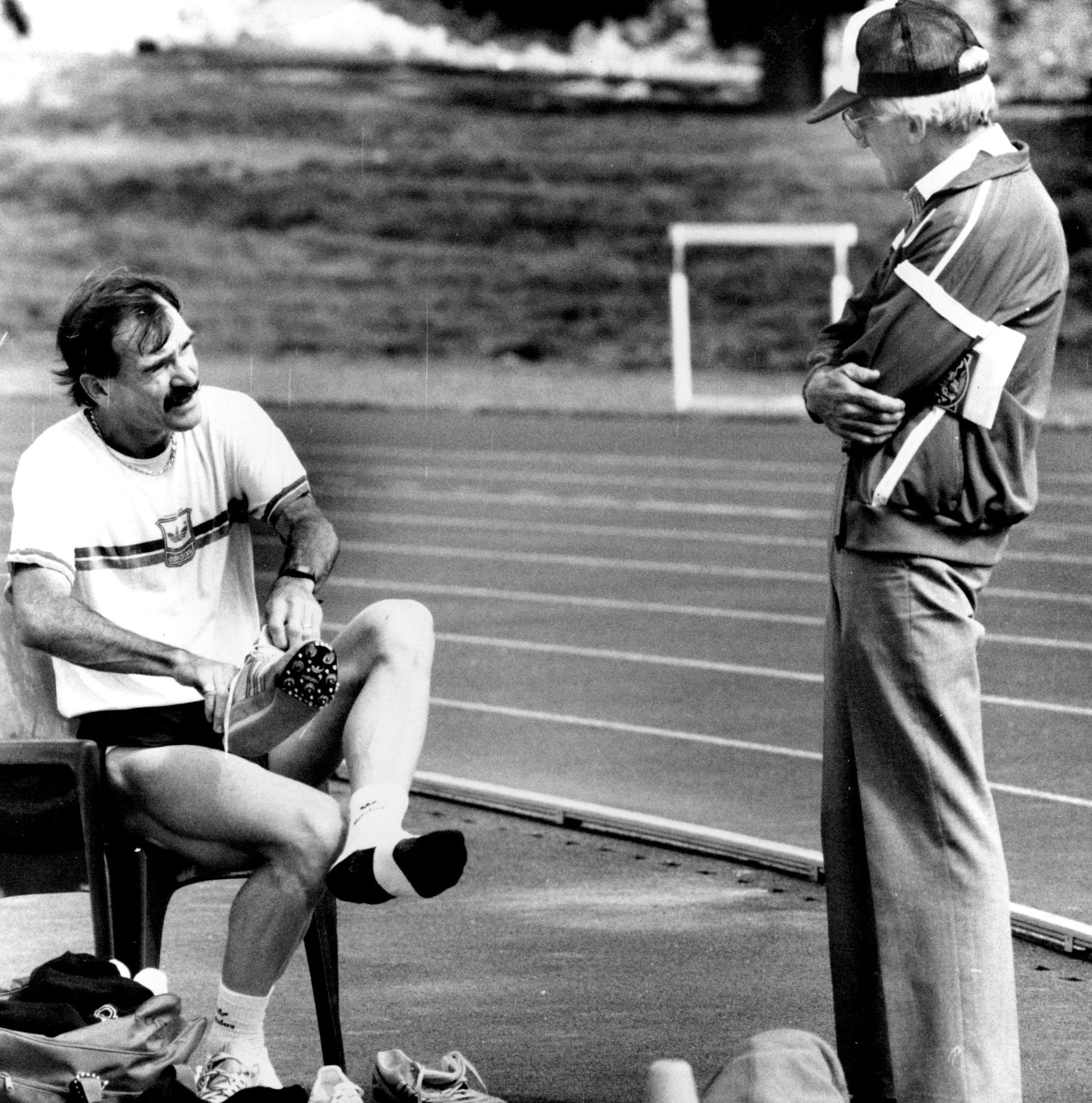
After spending a fleeting moment tucked behind Ikangaa, de Castella surged ahead of his diminutive but graceful opponent, again triggering celebration.
Ikangaa twice stole back the lead, but de Castella unleashed a third attack on the Coronation Drive hill to break his gutsy rival.
"We had a great tussle," de Castella says.
"They're the sorts of encounters that as elite athletes you live for. You want to win in the first place, but you want to make it a battle.
"Juma, to his credit ... even though I pulled him in and was running heaps faster, there was no way he was just going to let me get away without a fight. It was great. I loved the fact we really had a great tussle over the last two kilometres or three kilometres."
The strength de Castella extracted on the hills on that momentous day was built over many years in Victoria's Dandenong Ranges and Canberra's Stromlo Forest.
"Hills, I've always believed, make you tough, not just physically but your spirit," de Castella says.
"You've got to be prepared to hurt yourself. I love the metaphor of a hill — focusing on the top and not giving up and pushing hard and knowing that when you get to the top there's a little bit of a chance to recover and coast.
"Hills were always part of my bread and butter and I always smiled inside when I saw a hill ... I just loved being aggressive on the hills."
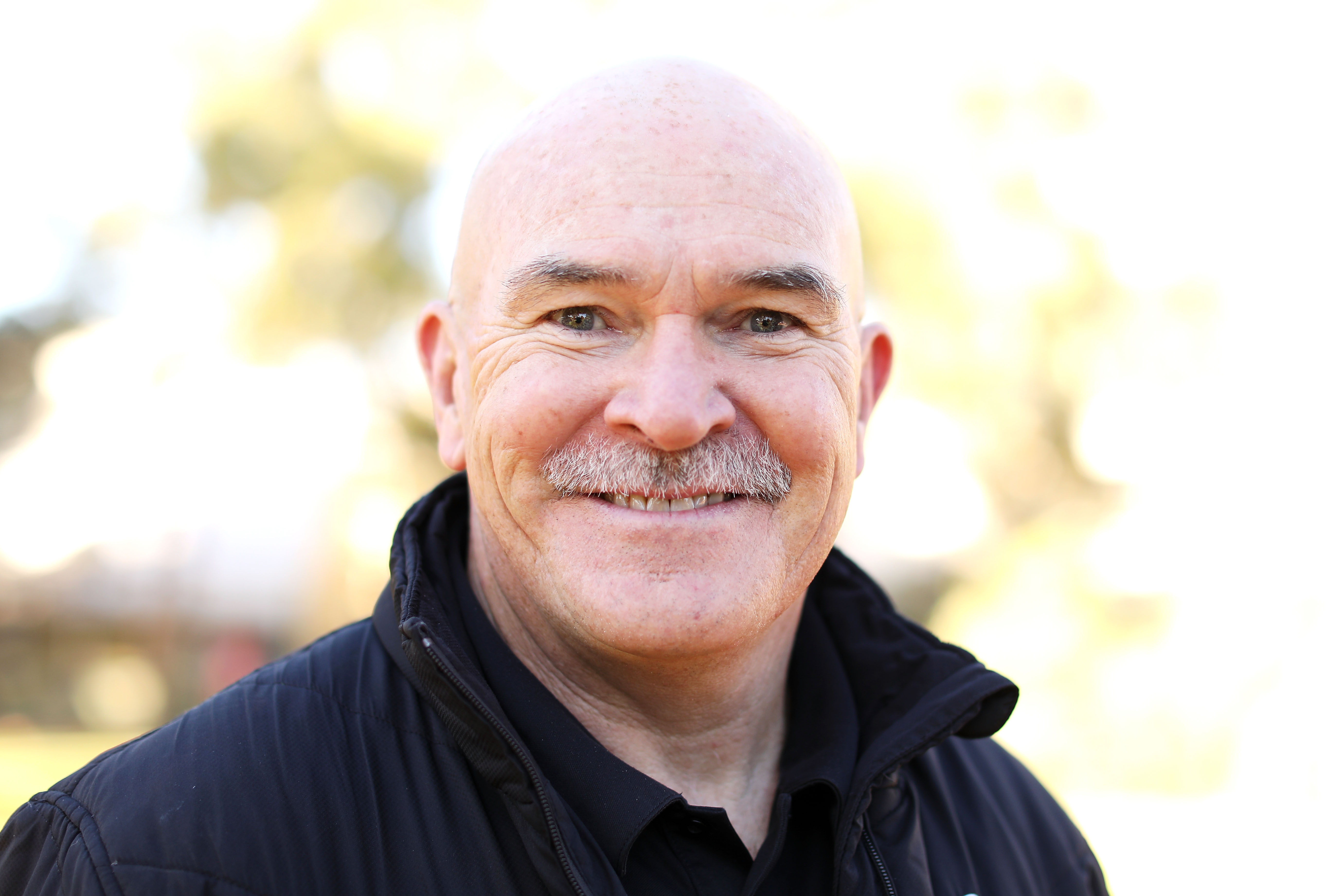
As de Castella tore down Stanley Street in pursuit of the finish line, thousands of spectators going crazy, he flung his arms in the air.
His winning time of 2:09:18 was 12 seconds quicker than Ikangaa's, and England's Mike Gratton collected bronze in 2:12.06.
As TV crews, photographers, reporters and many other keen observers scrambled for the best view they could find, Australia's newest gold medallist was handed a bottle of champagne and tipped it over his head.
An ecstatic Clohessy even hoisted his star pupil into the air.
De Castella, a future marathon world champion, had blitzed his first marathon in Australia and captured the hearts of the nation.
"The way it unfolded — you couldn't have scripted it better in hindsight," de Castella says.
"No way had I planned for it to unfold the way it did, but I timed my second half to perfection, catching Juma a couple of kilometres out and having a battle and then being able to break away.
"You never allow the emotions to come to the surface until you've actually won, but that last little bit where you do let the emotions out and you cross that finish ... it really is one of the best feelings ever."
Forty years on, his former coach is 89.
"Pat's getting old, he's relocated, retired up there in Brisbane," de Castella says.
"Every time I'm up there I catch up with him and we relive and go over the glory days."
For a daily dose of the best of the breaking news and exclusive content from Wide World of Sports, subscribe to our newsletter by clicking here!
As the 40th anniversary of Robert de Castella's triumph at the 1982 Commonwealth Games draws closer, the Australian marathon legend remembers the "choreography" and "drama".
Not only had a world-record run in the Fukuoka marathon a year earlier installed de Castella as a hot favourite, a hugely successful Brisbane Commonwealth Games were wrapping up as the runners gathered on Stanley Street at 6am.
What followed was a 42.195-kilometre grind in which de Castella dragged himself back from a seemingly doomed position to win in 2:09:18 on a hilly course.
ULTIMATE GUIDE: Commonwealth Games 2022
READ MORE: The big lesson 'emotional' week taught Manly
READ MORE: Ricciardo's defiance 'no surprise' to McLaren
Moments after, Australian running icon Ron Clarke described the performance as "the best marathon ever run".
De Castella, 25 at the time, had wound through streets packed with thousands of spectators cheering wildly for their hero at home.

"It was like this wall ... that would part when I got within a few metres of them," he tells Wide World of Sports.
"So it was an amazing atmosphere."
Brisbane's humidity had hit 94 per cent by the time the gun was fired, but the sweltering conditions didn't stop two Tanzanians and a Kenyan dashing straight to the lead.
De Castella, nestled in a pack of nine, clocked 15:09 for the first five kilometres, placing him on track to beat his own world record.
But the two Tanzanians, Juma Ikangaa and Gidamis Shahanga, and Kenyan Sammy Mogere, had flown through five kilometres in 14:45.
Despite surrendering a considerable lead early, de Castella wasn't worried.
"I always believed that the marathon is about the last 10 kilometres; it's not about the first 30. So, I was optimistic that maybe they'd gone out too fast," de Castella says.
"I knew it was warming up ... the conditions were getting tougher and tougher."

The first chasing pack quickly gobbled up Mogere, but the Tanzanians were putting on a show of resistance that had de Castella's coach worried.
Pat Clohessy, positioned at the Crest Hotel, had pain written all over his face as de Castella passed halfway 40 seconds behind the leaders.
"Coming back through Brisbane in the city when I saw my coach on the starting line ... I saw the real worried look on his face," de Castella says with a laugh, while admitting he had "no idea" how far behind he'd fallen.
"At that stage I was just settling into a bit of a rhythm and a groove with the other guys, and I think when I saw that it gave me a bit of a wake-up."
But Ikangaa and Shahanga continued to streak ahead.
They led by 55 seconds at 25 kilometres and 58 seconds at 30 kilometres, by which point de Castella had powered ahead of the first chasing pack.
If the Victorian was to have the gold medal draping around his neck, he had to make a move.

"I pulled my finger out and really started to get out and chase," de Castella says.
"I flicked the switch from being relatively coasting and relatively comfortable to putting a bit of pressure on myself.
"I mainly just remember the look on Pat's face, which I think I'll remember forever. He really wears his heart on his face, and to see the concern that he had was a bit of a shock."
De Castella was suddenly hit with intense stomach pain, but he ploughed through the discomfort as he powered from the 30-kilometre mark to the 35-kilometre point in 15:28 — 20 seconds quicker than Ikangaa, who had opened a gap on Shahanga.
De Castella mowed down Shahanga at 37 kilometres, prompting roars from footpaths, packed local pubs and the thousands following every move on radio or TV.
It was about 39 kilometres into the run that de Castella, pounding up the hill on Coronation Drive, loomed up on Ikangaa.
The African — short, slim and lithe — glanced over his right shoulder as the moustachioed de Castella — driving his bushy tree-trunk legs and pumping his arms — drained every ounce of energy from his hulking frame.

After spending a fleeting moment tucked behind Ikangaa, de Castella surged ahead of his diminutive but graceful opponent, again triggering celebration.
Ikangaa twice stole back the lead, but de Castella unleashed a third attack on the Coronation Drive hill to break his gutsy rival.
"We had a great tussle," de Castella says.
"They're the sorts of encounters that as elite athletes you live for. You want to win in the first place, but you want to make it a battle.
"Juma, to his credit ... even though I pulled him in and was running heaps faster, there was no way he was just going to let me get away without a fight. It was great. I loved the fact we really had a great tussle over the last two kilometres or three kilometres."
The strength de Castella extracted on the hills on that momentous day was built over many years in Victoria's Dandenong Ranges and Canberra's Stromlo Forest.
"Hills, I've always believed, make you tough, not just physically but your spirit," de Castella says.
"You've got to be prepared to hurt yourself. I love the metaphor of a hill — focusing on the top and not giving up and pushing hard and knowing that when you get to the top there's a little bit of a chance to recover and coast.
"Hills were always part of my bread and butter and I always smiled inside when I saw a hill ... I just loved being aggressive on the hills."

As de Castella tore down Stanley Street in pursuit of the finish line, thousands of spectators going crazy, he flung his arms in the air.
His winning time of 2:09:18 was 12 seconds quicker than Ikangaa's, and England's Mike Gratton collected bronze in 2:12.06.
As TV crews, photographers, reporters and many other keen observers scrambled for the best view they could find, Australia's newest gold medallist was handed a bottle of champagne and tipped it over his head.
An ecstatic Clohessy even hoisted his star pupil into the air.
De Castella, a future marathon world champion, had blitzed his first marathon in Australia and captured the hearts of the nation.
"The way it unfolded — you couldn't have scripted it better in hindsight," de Castella says.
"No way had I planned for it to unfold the way it did, but I timed my second half to perfection, catching Juma a couple of kilometres out and having a battle and then being able to break away.
"You never allow the emotions to come to the surface until you've actually won, but that last little bit where you do let the emotions out and you cross that finish ... it really is one of the best feelings ever."
Forty years on, his former coach is 89.
"Pat's getting old, he's relocated, retired up there in Brisbane," de Castella says.
"Every time I'm up there I catch up with him and we relive and go over the glory days."
For a daily dose of the best of the breaking news and exclusive content from Wide World of Sports, subscribe to our newsletter by clicking here!
https://ift.tt/Cc5m2fF//

No comments:
Post a Comment